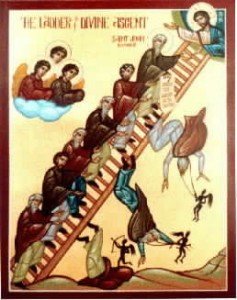 This continues thoughts on the 25th Step of John’s Ladder, HUMILITY. One way to understand humility is that it is a continuous paradox of contrition and joy, the mingling of tears and gratitude. This is why humility overcomes all the passions. Anger, avarice, lust, greed, despondency, hatred, the remembrance of wrongs – all these spring from a deep-seated ingratitude and a blinding love of self. To be humble, on the other hand, is to live in a joyful and peaceful state of real thankfulness. Being the virtue that overwhelms our ego, dissatisfaction and ingratitude, humility dispels all vainglorious pursuits, all anger and resentment. St. John wrote:
This continues thoughts on the 25th Step of John’s Ladder, HUMILITY. One way to understand humility is that it is a continuous paradox of contrition and joy, the mingling of tears and gratitude. This is why humility overcomes all the passions. Anger, avarice, lust, greed, despondency, hatred, the remembrance of wrongs – all these spring from a deep-seated ingratitude and a blinding love of self. To be humble, on the other hand, is to live in a joyful and peaceful state of real thankfulness. Being the virtue that overwhelms our ego, dissatisfaction and ingratitude, humility dispels all vainglorious pursuits, all anger and resentment. St. John wrote:
As soon as the cluster of holy humility begins to flower within us, we come, after hard work to hate all earthly praise and glory. We rid ourselves of rage and fury; and the more this queen of virtues spreads within our souls through spiritual growth, the more we begin to regard all our good deeds as of no consequence…. Where there is humility there will be no sign of hatred, no species of quarrelsomeness, no whiff of disobedience – unless of course some question of faith arises.
Here St. John reminds us that obedience (which is part and parcel of humility) is not blind subjugation. When obedience means betraying our faith, doing or agreeing to something we know to be wrong, humility does not compel us to obey, but rather gives us the courage to take a stand. For humility is rooted not in cowardice, but in the fear and love of God.
We Christians are always bleating on about humility, yet hardly any of us have it. Perhaps we forget that humility is not merely a virtue to be admired, but one to be strived for. It is all very well praising saints and spiritual fathers for their great humility, but unless we make some effort to acquire humility ourselves, such praise will not get us very far.
